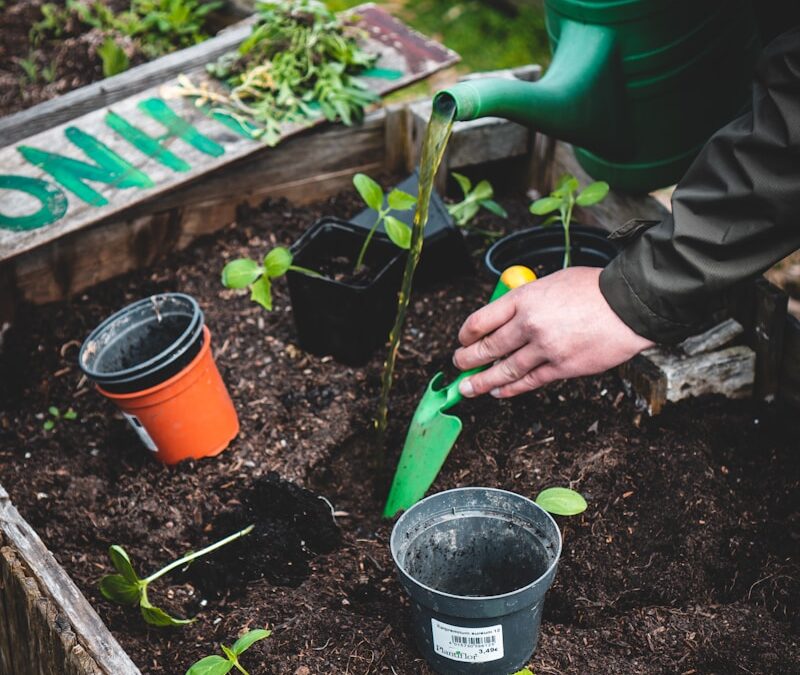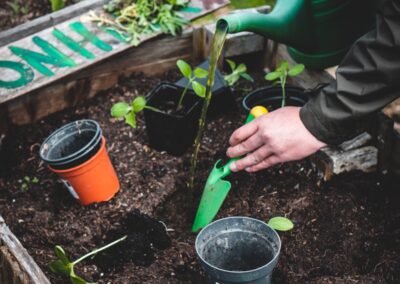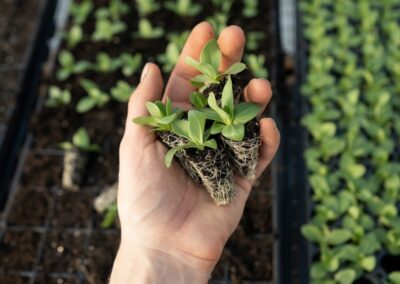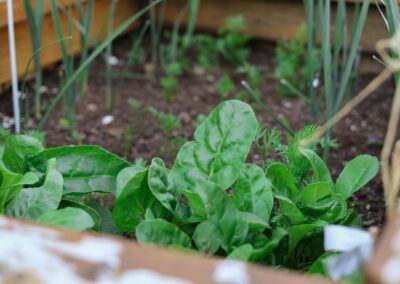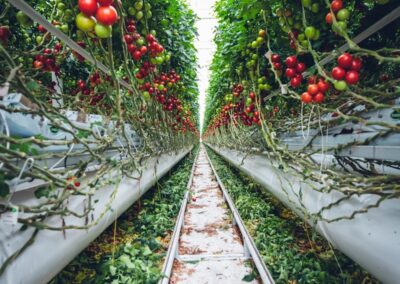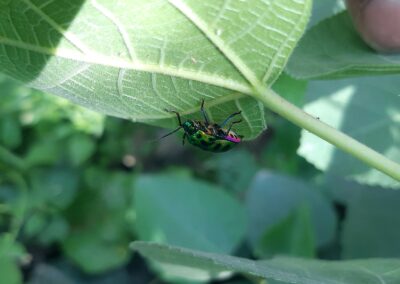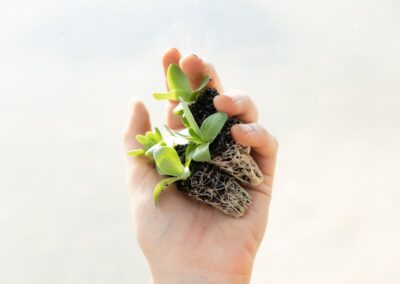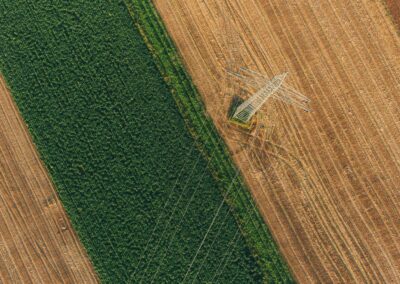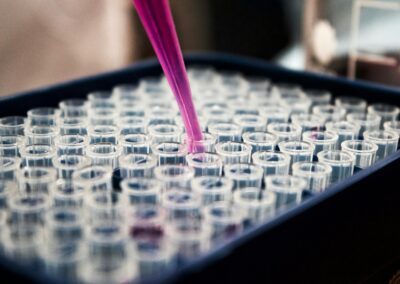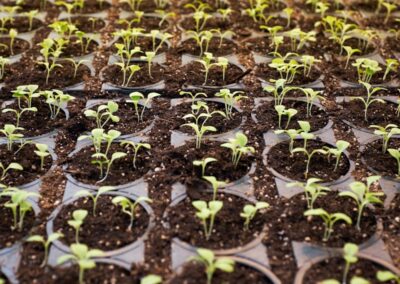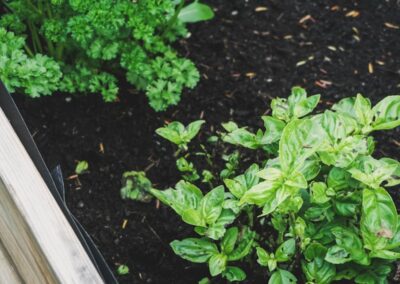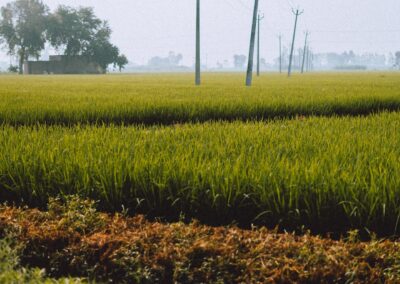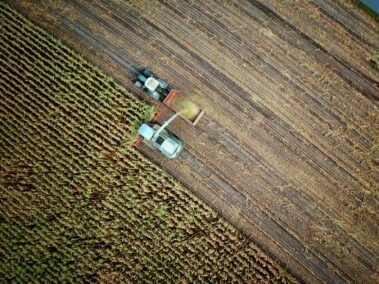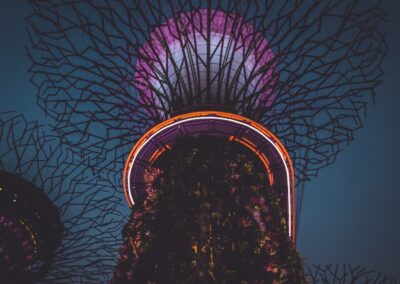Exploring Advanced Technologies for Sustainable Urban Agriculture
Revolutionizing Agriculture with Smart Irrigation Systems
Innovative irrigation and lighting systems in vertical farming are transforming how we approach agriculture, particularly in urban environments like Saudi Arabia and the UAE. These advanced technologies are designed to maximize crop yield while minimizing resource consumption, addressing the challenges of traditional farming methods. Business executives, mid-level managers, and entrepreneurs must recognize the potential of these innovations to ensure sustainable and profitable agricultural practices.
In Riyadh, smart irrigation systems are being integrated into vertical farming setups to optimize water usage and ensure precise delivery of nutrients. These systems use sensors to monitor soil moisture levels, plant health, and environmental conditions in real time. Data collected from these sensors is analyzed using artificial intelligence (AI) algorithms to determine the exact amount of water and nutrients needed by each plant. This approach not only conserves water but also enhances crop growth and yield. By adopting smart irrigation systems, vertical farms in Riyadh can achieve greater efficiency and sustainability, contributing to the region’s food security goals.
Moreover, advanced irrigation techniques such as hydroponics and aeroponics are gaining popularity in Dubai’s vertical farming sector. Hydroponics involves growing plants in nutrient-rich water solutions, while aeroponics suspends plants in the air and mist their roots with nutrient solutions. These methods significantly reduce water usage compared to traditional soil-based farming. Additionally, they allow for precise control over the nutrient delivery, resulting in faster growth rates and higher yields. The implementation of these innovative irrigation systems in Dubai’s vertical farms demonstrates the potential of modern technology to revolutionize agriculture and support urban sustainability.
Another key innovation is the use of drip irrigation systems, which deliver water directly to the plant roots through a network of tubes and emitters. This method minimizes water loss due to evaporation and runoff, making it highly efficient for vertical farming. In Saudi Arabia, where water scarcity is a pressing issue, drip irrigation systems are particularly valuable. By ensuring that every drop of water is used effectively, these systems help vertical farms maximize productivity while conserving vital resources. The integration of drip irrigation into vertical farming exemplifies how technological advancements can address environmental challenges and promote sustainable agriculture.
Harnessing Energy-Efficient Lighting for Optimal Crop Growth
Energy-efficient lighting systems are another critical component of innovative vertical farming practices, enhancing crop growth and reducing energy consumption. In regions like Saudi Arabia and the UAE, where vertical farming is becoming increasingly important, advanced lighting technologies are playing a pivotal role in creating sustainable and productive agricultural environments.
Light-emitting diode (LED) lighting is at the forefront of this transformation. LEDs are highly efficient, providing the specific wavelengths of light that plants need for photosynthesis while consuming less energy than traditional lighting systems. In Riyadh, vertical farms are utilizing LED grow lights to simulate natural sunlight, allowing for year-round crop production regardless of external weather conditions. These lights can be adjusted to emit different wavelengths, optimizing the light spectrum for various growth stages of the plants. By using LED lighting, vertical farms can achieve significant energy savings and improve crop yields, making them more economically and environmentally sustainable.
Additionally, the use of smart lighting systems is enhancing the efficiency of vertical farming operations in Dubai. These systems incorporate sensors and AI to monitor plant growth and adjust lighting conditions accordingly. For instance, smart lighting can increase light intensity during the day to boost photosynthesis and reduce it at night to conserve energy. This dynamic adjustment ensures that plants receive the optimal amount of light at all times, promoting healthy growth and maximizing yields. The adoption of smart lighting systems in Dubai’s vertical farms highlights the potential of AI and automation to enhance agricultural productivity and sustainability.
Furthermore, innovative lighting techniques such as vertical farming towers equipped with integrated LED lighting are gaining traction. These towers utilize space more efficiently by stacking multiple layers of plants, each illuminated by energy-efficient LEDs. In Saudi Arabia, such vertical farming towers are being implemented to increase food production capacity within limited urban spaces. The integration of LEDs into these towers ensures that each plant receives sufficient light, promoting uniform growth and high yields. By leveraging vertical farming towers with advanced lighting, urban agriculture can become a viable solution for meeting the food demands of growing populations.
The Role of Technology and Leadership in Vertical Farming
The successful implementation of innovative irrigation and lighting systems in vertical farming relies heavily on technology and leadership. Business executives, mid-level managers, and entrepreneurs in Saudi Arabia and the UAE must leverage these technologies and demonstrate strong leadership to ensure the success of their vertical farming initiatives.
Artificial intelligence is transforming vertical farming by enabling data-driven decision-making and predictive modeling. In Riyadh, AI algorithms analyze data from sensors and monitoring systems to optimize irrigation and lighting schedules. This ensures that plants receive the right amount of water, nutrients, and light at the right times, enhancing growth and yield. By harnessing the power of AI, vertical farms can operate more efficiently and sustainably, contributing to food security and environmental conservation.
Blockchain technology is also playing a significant role in ensuring the integrity and transparency of vertical farming operations. In Dubai, blockchain is used to track the provenance of seeds, monitor compliance with organic farming standards, and verify the quality of produce. This technology enhances accountability and builds trust among consumers, promoting the adoption of vertical farming practices. By integrating blockchain into vertical farming, business leaders can ensure that their operations meet the highest standards of quality and sustainability.
The metaverse, a virtual shared space, offers new opportunities for collaboration and innovation in vertical farming. In Saudi Arabia, engineers and agricultural experts use the metaverse to conduct virtual walkthroughs of vertical farming facilities, assess their performance, and collaborate with stakeholders in real time. This immersive environment facilitates better communication and decision-making, enabling the development of more resilient and sustainable vertical farming systems. By embracing the metaverse, business leaders can drive innovation and ensure that their vertical farming projects are at the forefront of agricultural technology.
Conclusion: Advancing Vertical Farming with Innovative Technologies
Innovative irrigation and lighting systems are revolutionizing vertical farming, offering solutions to maximize crop yield and minimize resource consumption. In high-risk areas like Saudi Arabia and the UAE, the integration of cutting-edge technologies and modern engineering practices is essential for ensuring the sustainability and productivity of urban agriculture. By establishing stringent standards, fostering collaboration among stakeholders, and leveraging advanced technologies such as AI, blockchain, and the metaverse, business executives, mid-level managers, and entrepreneurs can navigate the challenges of vertical farming and create systems that are both efficient and sustainable.
As the field of vertical farming continues to evolve, the importance of ethical leadership and technological innovation will only increase. By demonstrating a commitment to excellence and embracing new technologies, leaders in Riyadh, Dubai, and beyond can ensure that their vertical farming projects are built to withstand the challenges of modern agriculture, protecting both the environment and investments. Ultimately, the successful implementation of innovative irrigation and lighting systems will pave the way for a more sustainable and resilient agricultural future, benefiting individuals and communities for generations to come.
—
#VerticalFarmingInnovation #SustainableAgricultureTechnology #SmartIrrigationSystems #EnergyEfficientLighting #VerticalFarmingInSaudiArabia #UAEUrbanAgriculture #RiyadhVerticalFarms #DubaiSustainableFarming #AIinAgriculture #ModernFarmingTechniques

